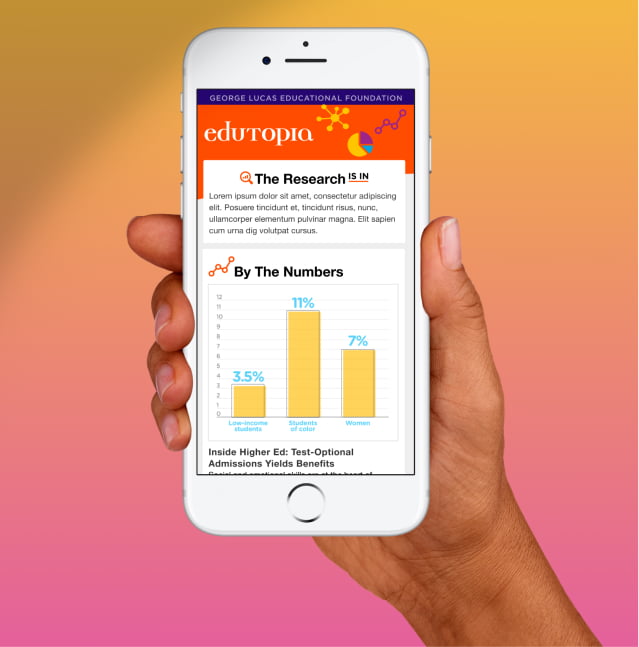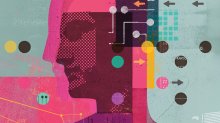Most Significant Education Studies
For those of us hoping for a quiet, back-to-normal kind of year, the research coming out in 2023 might disappoint. A rising tide of teenage mental health issues sent researchers scurrying for answers, and the sudden ascendance of AI posed a new threat to codes of academic conduct and caused some educators to forecast the end of teaching as we know it (we’re here to dispel that myth).
There was plenty of good news in the mix—and fascinating news, too. Neuroscientists continued to push the envelope on mapping the human brain, using cutting-edge technology to get a sneak peek at the “brain synchrony” between students and teachers as they learn about complex topics, and a comprehensive review of social and emotional learning confirmed, once again, that there’s no substitute for caring, welcoming school environments.
Most Significant Education Studies Finally, we did our due diligence and unearthed classroom strategies that can make a big difference for students, from the use of math picture books to a better, more humane way to incorporate tests and games of knowledge into your classroom activities.

1. AI MAY CUT AN EDUCATOR’S PLANNING TIME DRAMATICALLY
Remarkably, the instructors also said they’d consider adopting the machine-generated questions for their courses.
That’s spooky, but not without its silver linings. Test creation is time-consuming for teachers, and one knowledgeable educator who took AI for a test drive says that it performs well on other tasks like planning lessons, writing instructions, and even composing emails to parents. New AI-powered tools like Diffit, Curipod, and MagicSchool.ai, meanwhile, are starting to sound like revolutionary teaching aids.
Most Significant Education Studies Concern that the end of human teaching is one software release away is premature. Studies we’ve reviewed suggest that AI still requires a lot of fine-tuning, and in July of 2023, researchers concluded that without human intervention, AI is atrocious at mathematics, performing poorly on open-ended problems and routinely flubbing even simple math calculations. To be useful, it turns out, AI may need us more than we need it.
2. A FASCINATING GUIDE TO BETTER QUIZZING
No one likes tests—except the three authors of a 2023 study, apparently. Most Significant Education Studies The trio, who have experience as teachers and researchers, sing the praises of virtually every kind of test, quiz, and knowledge game, asserting that such assessments should be frequent, low-stakes, highly engaging, and even communal. Their rationale: When properly designed and stripped of dread, tests and quizzes dramatically improve “long-term retention and the creation of more robust retrieval routes for future access,” a well-established phenomenon known as the testing effect.
The study is a fascinating, granular look at the mechanics of testing and its impacts on learning. Here are some of the highlights:
Mix it up: To maximize student engagement, quiz students frequently, but don’t let the format get stale. In their analysis, the authors endorse testing formats as varied as multiple choice, cued-recall tests, clickers, fill-in-the-blank, short answer, and contests of knowledge.
Be competitive: When designing multiple-choice or true-false tests, opt for “competitive alternatives” in your answers. For example, when asking “What is the hottest terrestrial planet?” proffer Venus, Mars, and Mercury instead of Venus, Uranus, and Saturn—because “Uranus and Saturn aren’t terrestrial planets.” Competitive alternatives require students to scrutinize all options, the authors hypothesize, leading them to retrieve and consider more learned material.
Pretest: Quizzing students on material they haven’t yet learned improves long-term performance “even if [students] are not able to answer any of those questions correctly,” according to the researchers. Notably, pretesting can also lead to “a reduction in mind wandering” during subsequent lessons.
Get communal: Asking students to take tests in groups can improve retention and motivation while reducing anxiety. Consider focusing on specific rather than open-ended questions, the authors caution, since students can sometimes “recall and remember information less accurately” when working together.
Pass it on: Teach students to self-test by “summarizing the main points from a lecture… without looking at any notes,” or by meeting in “small study groups where the students practice testing one another—an activity that many students already report doing.”
3. HOW TONE OF VOICE CHANGES CLASSROOM CULTURE
Like the proverbial canary in the coal mine, subtle shifts in a teacher’s tone of voice—a sharp rise in volume or a sudden barrage of repeated instructions born of frustration—can be the first sign that something’s awry in the classroom, disturbing a fragile equilibrium and leading students to clam up or act out, a study published late in 2022 suggests.
Researchers observed as teens and preteens listened to instructions given by teachers—“I’m waiting for people to quiet down” or “It’s time to tidy up all of your belongings,” for example—delivered in warm, neutral, or controlling tones. While the effect was unintended, an authoritative tone often came off as confrontational, undermining students’ sense of competence and discouraging them from confiding in teachers. Warm, supportive tones, on the other hand, contributed to a classroom environment that reinforced learning across multiple social and academic dimensions like sense of belonging, autonomy, and enjoyment of the class.
It takes years to find the right tonal balance, says experienced middle school teacher Kristine Napper. “Neither high expectations nor kind hearts can do the job alone,” she coaches. Instead, teachers should strive for a warm, supportive tone and then draw on that “wellspring of trust to hold students to high standards of deep engagement with course content.”
4. BRAINS THAT FIRE TOGETHER WIRE TOGETHER
In 2021, we reported that as students progressed through a computer science course, the learning material left neural fingerprints that mirrored brain activity in other students, the teacher, and experts in the field. “Students who failed to grasp the material,” we wrote, “exhibited neural signatures that were outliers; they were drifting.”
A 2023 study using electroencephalography (EEG) largely confirms those findings. around an accurate, common understanding of the material.
5. IN SUM, MATH PICTURE BOOKS WORK
The old adage that a picture is worth a thousand words—and two are worth two thousand—might be expressed, mathematically, as a simple multiplication formula. But can reading math picture books really multiply learning?
Importantly, math picture books weren’t a substitute for procedural fluency or mathematical practice. Typically, the authors noted, teachers bracketed math units with picture books, introducing a mathematical concept “in order to prepare [students] for the upcoming practice and activities,” or, alternatively, used them to review material at the end of the lesson.
6. TO IMPROVE STUDENT WRITING, REDUCE FEEDBACK (AND PUT THE ONUS ON KIDS)
It’s hard to move the needle on student writing. A promising, time-saving alternative is to deploy rubrics, mentor texts, and other clarifying writing guidelines.
7. A NEW THEORY ABOUT THE TEEN MENTAL HEALTH CRISIS
Whatever the cause, young children seem to sense that something’s off.
8. DIRECT INSTRUCTION AND INQUIRY-BASED LEARNING ARE COMPLEMENTARY
It’s an often-fiery but ultimately dubious debate: Should teachers employ direct instruction or opt for inquiry-based learning?
Most Significant Education Studies Both sides misrepresent what teachers actually do in classrooms. Instructional models are “often combined in practice,” the researchers note, and inquiry-based learning is usually supported with direct instruction.
9. A TRULY MASSIVE REVIEW FINDS VALUE IN SEL—AGAIN
Most Significant Education Studies It’s déjà vu all over again. T. A 2021 Thomas B. Fordham Institute survey revealed that parents reacted negatively to classroom instruction labeled “social and emotional learning,” but were favorably disposed when a single clause was added—calling it “social-emotional & academic learning”—which” turned the tide and secured parental buy-in.
10. MORE EVIDENCE FOR MOVING PAST “FINDING THE MAIN IDEA”
Most Significant Education Studies In the United States, the teaching of reading comprehension has ping-ponged between skills-based and knowledge-based approaches.
Compared to their counterparts in business-as-usual classes, the “knowledge-based” readers scored 18 percent higher on general reading comprehension.
The pendulum is swinging, but the researchers caution against overreaching. We may have the balance out of whack, but to develop proficient readers, you need both.

